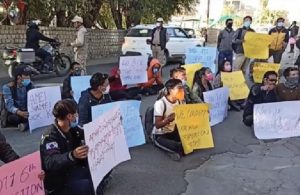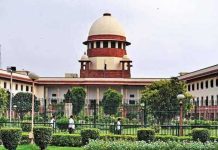 In an unprecedented move, all political parties in Leh including the BJP have decided to boycott the elections to Ladakh Hill Development Council (LAHDC) pending grant of 6th Schedule of Constitution to the union territory. The safeguards under the constitutional provision are sought to protect the land, jobs and the identity of Ladakh.
In an unprecedented move, all political parties in Leh including the BJP have decided to boycott the elections to Ladakh Hill Development Council (LAHDC) pending grant of 6th Schedule of Constitution to the union territory. The safeguards under the constitutional provision are sought to protect the land, jobs and the identity of Ladakh.
What is more, the parties have embarked on political mobilization to demand their rights. When the senior J&K BJP leader Ashok Kaul termed the demand for 6th Schedule as “non-sense,” the people came out on the roads to protest.
“Wapas jao, wapas jao, Ashok Kaul wapas jao (Go back, Ashok Kaul),” shouted the protesters outside the hotel where Kaul was staying. The protest was led by newly formed People’s Movement for Sixth Schedule (PMSSL) for Ladakh, an amalgam of different
political parties and socio-religious organizations.
“The apex body of people’s movement for sixth schedule for Ladakh, unanimously resolved to boycott the ensuing 6th LAHDC Leh election till such time the Constitutional safeguard under 6th schedule on the line of Bodo Territorial Council is not extended to Ladakh UT and its people,” a joint statement issued by the PMSSL said.
Significantly, the statement has also been signed by the local BJP president Nawang Sawstan.
Earlier, the LAHDC, an elected body, charged with local governance in Leh had passed a resolution demanding safeguards for Ladakh’s unique identity.
“Owing to Ladakh’s distinct socio-cultural aspect, its strategic location and fragile eco-system, the general public cutting across all sections of society have been demanding constitutional safeguard for protection of land, employment, environment, business and culture,” the resolution moved by the Deputy Chairman LAHDC, Leh Tsering Samdup read.
Ladakh has two LAHDCs for its twin districts Leh and Kargil. Total population of Ladakh, according to 2011 census is 2.74 lakh. While Leh with a population of 1,33,487 is Buddhist majority, Kargil with a population of 1,40,802 is Muslim majority.
The resolution offered the centre several options to address the issue: “Union Territory of Ladakh be granted constitutional safeguards — either under 6th schedule or Article 371 or Domicile Act of the constitution of India to protect the tribal rights of indigenous people of Ladakh”.
But now the political consensus in Leh is around 6th Schedule. Interestingly, LAHDC Kargil does not support the Leh resolution, nor the boycott exercise. Instead, Kargil demands a reversal of revocation of Article 370 and 35A and wants to be re-united with the Kashmir Valley.
However, Leh’s problem is not only the threat to the identity of the district as a Buddhist majority area but also the political empowerment of the place. In the new scheme of things, the democratically elected LAHDCs, both of Leh and Kargil, have become redundant. The region is now directly ruled by the centre through a Lieutenant Governor. So, elections to LAHDCs mean little for the regional empowerment.
“The UT status for Ladakh was our long pending demand but we also wanted legislature. But in the post-Article 370 arrangement we have no legslature,” said Ladakhi leader Chering Dorjay, who quit the BJP in May when he was the party’s Ladakh chief.
Leh’s problem is two-fold: Deprived of the constitutional protections under Article 370 and 35A, Leh feels suddenly vulnerable to influx of people from rest of the country and consequent dilution of its identity. In addition, as a union territory, Leh has even been deprived of local self governance. “We demand that until or unless the government doesn’t empower the hill council, election has no meaning,” Jigmet Paljor, Chief Coordinator Ladakh Students’ and Environmental Action Forum, who is one of the members of PMSSL said. “We want safeguards for our culture, identity, environment and other things. We hope the Government will not take any step that threatens the unique culture of Ladakh”.













